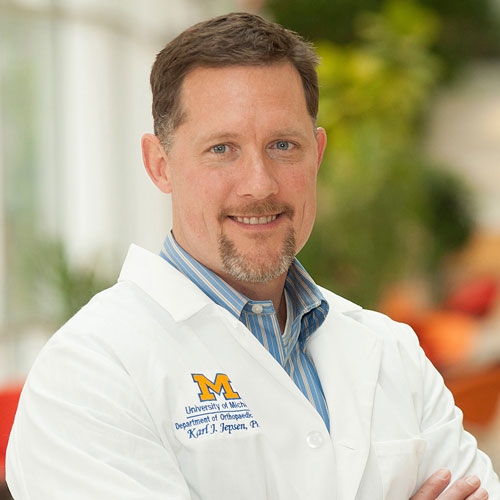
Available to mentor

The primary objective of my research program is to understand how complex adaptive systems like bone establish function during growth and maintain function during aging. Having a better understanding of how complex systems work will benefit efforts to reduce skeletal fracture risk by identifying the genetic and environmental factors that impair (or promote) specific components of the functional adaptation process and that compromise (or improve) fracture resistance.
-
Postdoctoral FellowCase Western Reserve University, Cleveland, 1996
-
PhDUniversity of Michigan, Ann Arbor, 1994
-
MSUniversity Of Michigan, Ann Arbor, 1992
-
MSWayne State University, Detroit, 1988
-
BSWayne State University, Detroit, 1987
-
Center MemberCaswell Diabetes Institute
Using a genetic randomization approach, my laboratory identified a pattern in the way skeletal traits covary across a population of recombinant inbred mouse strains. This line of research established that variation in bone morphology is functionally related to tissue-mineralization (tissue-quality). These functional interactions, known in the broader literature as phenotypic integration, are part of the functional adaptation process wherein mutations affecting external bone size are compensated by coordinated changes in tissue-quality. I have placed a large emphasis on translating the biological concepts learned from the mouse directly to the human skeleton, which shows similar functional trait interactions as the mouse skeleton. Further, we demonstrated that individuals are at risk of developing an insufficiency fracture for different biomechanical reasons. Importantly, studies of the mouse and human skeletons have shown that functional interactions among adult traits are established by 2-4 weeks of age in the mouse and by 4 years in humans. This latter research effort is the reason why a major focus of my lab involves studying how and when these functional interactions arise during postnatal growth. I expect that genetic or environmental perturbations expressed during this critical window will impair the development of bone strength and lead to increased fracture risk later in life.
Recently, my lab discovered a novel association between a measure of external bone size and the internal remodeling process that is central to establishing and maintaining bone strength. This observation motivated us to apply what we learned thus far in complex adaptive systems and to conduct an analysis of secondary data utilize existing longitudinally acquired human data to test whether individuals with narrow bones would show age-related changes in bone structure and strength that differed from individuals with wide bones. Examination of 14 year changes in BMC, bone area and BMC indeed revealed that women with narrow femoral necks showed small reductions in BMC (consistent with having a lower baseline level of intra-cortical remodeling) but large increases in bone area. In contrast, women with wide femoral necks showed large reductions in BMC (consistent with having a higher baseline level of intra-cortical remodeling) but only small increases in bone area. Our current research efforts are directed toward better understanding how external-size dependent changes in structure and mass affect bone strength and thus create different strength-decline trajectories during the menopausal transition. Better understanding this global-level regulation of intra-cortical remodeling may be critically important for developing prophylactic treatments for reducing stress (insufficiency) and fragility fractures that are personalized to the biological needs of the individual. Together, these studies have demonstrated how a simple measure like external bone size can help predict how bones grow and age.
-
Loundagin LL, Bredbenner TL, Jepsen KJ, Edwards WB. Curr Osteoporos Rep, 2024 Oct; 22 (5): 495Journal ArticleCorrection: Bringing Mechanical Context to Image-Based Measurements of Bone Integrity.
DOI:10.1007/s11914-023-00829-z PMID: 37837513 -
Jepsen KJ, Bigelow EMR, Goulet RW, Nolan BT, Casden MA, Kennedy K, Hertz S, Kadur C, Clines GA, Leis AM, Karvonen-Gutierrez CA, Bredbenner TL. JBMR Plus, 2024 Apr; 8 (4): ziae013Journal ArticleStructural differences contributing to sex-specific associations between FN BMD and whole-bone strength for adult White women and men.
DOI:10.1093/jbmrpl/ziae013 PMID: 38523663 -
Whitney DG, Caird MS, Raggio CL, Hurvitz EA, Clines GA, Jepsen KJ. Bone, 2023 Oct; 175: 116855Journal ArticlePerspective: A multi-trait integrative approach to understanding the structural basis of bone fragility for pediatric conditions associated with abnormal bone development.
DOI:10.1016/j.bone.2023.116855 PMID: 37481149 -
Jepsen KJ, Bigelow EM, Casden MA, Goulet RW, Kennedy K, Hertz S, Kadur C, Nolan BT, Richards-McCullough K, Merillat S, Karvonen-Gutierrez CA, Clines G, Bredbenner TL. JBMR Plus, 2023 Mar; 7 (3): e10715Journal ArticleAssociations Among Hip Structure, Bone Mineral Density, and Strength Vary With External Bone Size in White Women.
DOI:10.1002/jbm4.10715 PMID: 36936363 -
Bolger MW, Romanowicz GE, Bigelow EMR, Ward FS, Ciarelli A, Jepsen KJ, Kohn DH. Bone, 2022 Oct; 163: 116481Journal ArticleDivergent mechanical properties of older human male femora reveal unique combinations of morphological and compositional traits contributing to low strength.
DOI:10.1016/j.bone.2022.116481 PMID: 35817317 -
Bigelow EMR, Goulet RW, Ciarelli A, Schlecht SH, Kohn DH, Bredbenner TL, Harlow SD, Karvonen-Gutierrez CA, Jepsen KJ. JBMR Plus, 2022 Aug; 6 (8): e10653Journal ArticleSex and External Size Specific Limitations in Assessing Bone Health From Adult Hand Radiographs.
DOI:10.1002/jbm4.10653 PMID: 35991534 -
Brown P, Goldentyer B. Lab Anim (NY), 2022 Jun; 51 (6): 150Journal ArticleA Word from OLAW and USDA.
DOI:10.1038/s41684-022-00983-4 PMID: 35641624 -
Whitney DG, Caird MS, Clines GA, Hurvitz EA, Jepsen KJ. Dev Med Child Neurol, 2022 Apr; 64 (4): 469 - 475.Journal ArticleClinical bone health among adults with cerebral palsy: moving beyond assessing bone mineral density alone.
DOI:10.1111/dmcn.15093 PMID: 34658010